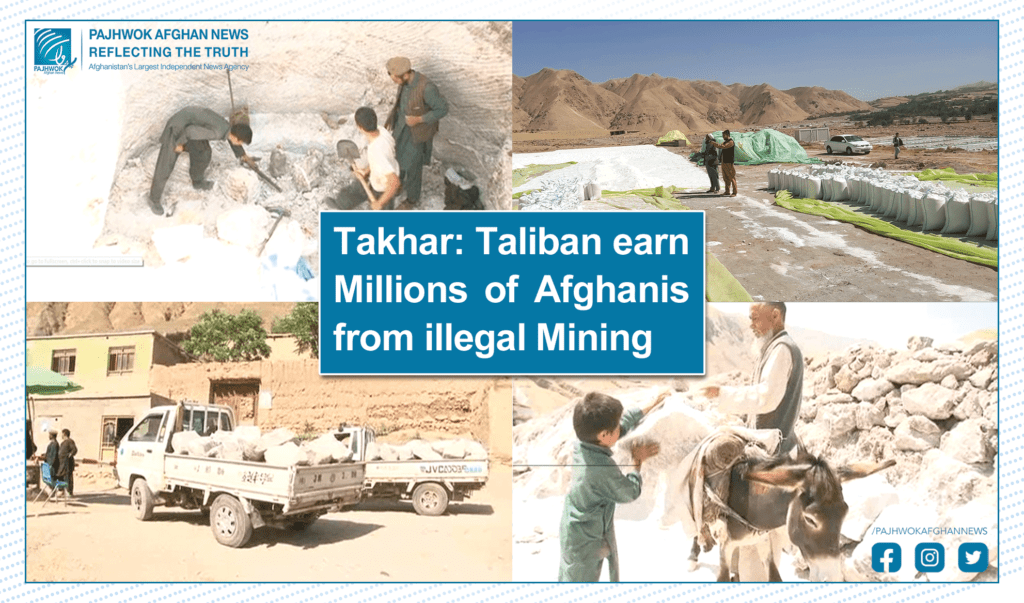TALOQAN (Pajhwok): Of the mines in northern Takhar province, six are being controlled by Taliban, five by the government and three by illegal gunmen, Pajhwok Afghan News’ findings show.
Preliminary surveys and research indicate 44 mines have been discovered in Takhar so far. Fourteen of them have been registered and the nature and quantity of deposits therein estimated.
Documents obtained by Pajhwok indicate the government is in control of coalmine in Chaal district, salt, sand and gold mines in Taloqan and the construction stone mine in Farkhar.
Four coalmines in Namak Aab and Chaal districts and the gold mines in Chah Aab and Khwaja Ghar districts are under Taliban’s control.
By the same token, the coalmine in the Ara Sheikh area of Namak Aab district, a goldmine in the Garmser area of Kalafkan district and another goldmine in Charagh Sai of Khwaja Ghar district are under the control of irresponsible gunmen.
Taliban earns millions from Takhar mines:
Mohammad Azam Afzali, a member of the provincial council, admitted the government was unable to extract minerals from the mines and did not allow others to invest in this vital sector.
“We have repeatedly asked the government to stop illegal mining in the province, but no action has been taken so far to stop the illegal activity,” the public representative lamented.
Due to interference from irresponsible gunmen, according to Afzali, contractors of Noraba, Taqcha Khana and salt mines have abandoned their work.
“When the companies left, the mines were left to irresponsible gunmen and the Taliban, who traditionally dig in them,” he explained.
Afzali claimed the Taliban earn about $100,000 on daily basis from the mines in Takhar, but the government did not stop them.
Meanwhile, Governor Maulvi Abdullah Qarlaq reckoned the Taliban had been receiving about 30 million afghanis a week from illegal mining in the province.
“They (rebels) can’t earn $100,000 a day, but they do pocket 30 million afghanis a week in revenue from the mines under their control,” the governor said.
Qarlaq added he had shared relevant information with higher-ups in Kabul to help them take action against illegal mining in Takhar.
Govt unable to exploit mineral wealth:
Mohammad Zaman Khan, head of civil society in Takhar, accused the government of lacking the capability and capacity of mineral extraction.
“We have talked to government officials several times to pave the way for investment in the mining sector to provide job opportunities for people. Mines can be snatched back from mafia groups, but the government is not serious about taking action in this regard,” he commented.
Obaidullah, a resident of Taloqan, deplored the government neither taking care of mines itself nor allowing anyone else to invest in the sector.
“Some of mines have been plundered by the Taliban and powerful individuals. Our concern is about the mines that remained untouched. There is a possibility of these individuals finding their way to such mines as well,” he remarked.
Bismillah Bek, a civil society activist, said most of the mines in the province remained untouched due to the government’s negligence.
Ahmad Zia Tariq, director of economy, confirmed several mines remained untouched due to insecurity and lack of required facilities.
“The government doesn’t have the capacity and foreign companies don’t invest because of insecurity. The government does plan to invest in the mining section,” he continued.
Tariq estimated 44 mines had been discovered in the province so far. Thirteen of them have been surveyed and registered. The rest need to be thoroughly researched.
Mining revenue fuelling Taliban’s war:
Abdul Qayyum Qane, administrative chief for Chah Aab district, alleged the Taliban were financing their war with revenue from illegal mining, electricity supply, zakat, usher and drug trafficking.
“The Nooraba goldmine in the district has been under Taliban’s control for two years. They extract gold every week and earn millions of afghanis,” he maintained.
Traders visited the mine every weekend to purchase gold from the Taliban, revealed Qane, who blamed local strongmen for paving the way for unlawful excavation by the Taliban.
Mirza Rahmani, a Takhar-based economist believed if mines in the province were well managed and smuggling curbed, the goal of balanced development could be achieved.
“Our youth travel abroad going through hundreds of problems to eke out a living. If investments are made in the development of the mining sector here, more jobs will be created for youth and these problems will be resolved,” he added.
The economist called on the government to allow the private sector to invest in the development and exploitation of mines.
Police claim protecting national assets:
Police spokesman Khalil Asir told Pajhwok they had put in place concrete measures for the protection of key installations and national assets.
“In recent years, responsibility for safeguarding mines has been entrusted to the public protection unit. But such unit has not been set up in Takhar so far,” Asir explained.
.On the other hand, Taliban spokesman Zabihullah Mujahid denied the insurgent movement received any revenue from mines in Takhar or other provinces.
There are coal, gold, plaster, sand, gravel and other mines in Takhar. However, the authorities have failed to rein in illegal mining and exploit the natural wealth.
sa/mud








GET IN TOUCH
NEWSLETTER
SUGGEST A STORY
PAJHWOK MOBILE APP